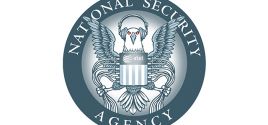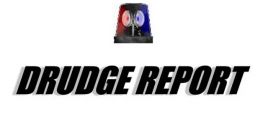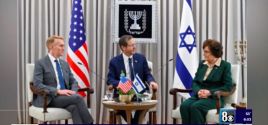Yawn. Another Big Drug Bustby Jacob G. HornbergerFeb. 25, 2014 |
Popular 
John Hagee Cheers Israel-Iran Battle as 'Gog and Magog War,' Will Lobby Congress Not to Deescalate

Patriot ACT on Steroids: FISA Bill Forces 'An Enormous Range' of Businesses to Act as NSA Spies

Right-Wing Media See Traffic Plummet in Wake of Algorithm Changes by Facebook, Google

Israel to Extend Water Agreement With Jordan 'For Helping Shoot Down Iranian Drones'

Congress Introduces ADL-Backed 'Countering Antisemitism Act' to Police Online Speech
 U.S. officials and the mainstream press are going gaga over the latest drug kingpin to go down. This one's name is Joaquin Guzman Loera, aka El Chapo, described by the New York Times in a front-page story today as "the world's most wanted man -- the chief executive of what experts describe as the world's most sophisticated narcotics enterprise, the Sinaloa cartel." The mainstream press is calling the arrest a "major victory in the fight against drug gangs in Mexico." U.S. officials, whose drug-war forces helped capture Guzman, are now seeking his extradition to the United States to stand trial for violating U.S. drug laws. All of this ballyhoo might well have an effect on younger Americans. To them, the arrest of a high-profile drug lord might seem like, "Wow! This shows that the drug war really is working! Maybe this arrest will mean less drugs coming into the United States." For older Americans, Guzman's arrest is just further confirmation of the utter inanity that the drug war has always been. After all, how many times have we older Americans experienced the much-publicized arrest of some big drug lord or the destruction of somebig drug cartel? As someone who grew up in the border town of Laredo, Texas, I've personally seen more of these much-ballyhooed drug busts than I care to remember. Consider the Medellin cartel out of Colombia, which was as famous in the 1970s and 1980s as the Sinaloa cartel is today. The leader of that cartel was a man named Pablo Escobar, one of the most famous drug lords of his time. He joined forces with a man named Carlos Lehder, another drug lord who was practically a household name in the 70s and 80s. The drug warriors ultimately killed Escobar and jailed Lehder here in the United States. The busts received the same type of big attention from U.S. officials and the mainstream press as Guzman's bust is receiving today. There was also the famous Cali Cartel, which was a main competitor to the Medellin cartel. In the 1990s, their leaders were tracked down and arrested. Again, big publicity about how officials had taken down another big drug gang. And there have been countless more drug lords arrested and drug cartels busted, big and small. And lots of major publicity provided by the mainstream press, just like with the Guzman arrest today. So what? What difference does it make? Oh sure, the busts might make drug warriors feel good in the sense that they're putting another "bad guy" in America's overcrowded prisons. But when I say "So what?" I mean, what difference does it make with respect to drugs? It has no effect on drug supply or drug demand. It's just another drug bust, one that will be used to justify the DEA's budget when Congress is deciding how to allocate taxpayer money. As libertarians have pointed out for decades, busting a drug lord or destroying a drug gang accomplishes nothing insofar as the drug business is concerned. Why is this so? The enterprise that is busted is immediately replaced by a new enterprise that is enticed into the drug business. It's really just basic supply and demand. As the drug warriors crack down on some gang, the price of the drugs goes up because supply is being constricted. As the price soars, so do the profits. That lures new people into the drug trade. It's a never-ending process. So, busting a big drug lord or some drug gang reaps nothing but a lot of publicity for the drug warriors. Unfortunately that's not the entire consequence of this whole sordid business. In the process of getting the guy at the top, cops have to go undercover, where oftentimes they are killed. The cops cultivate snitches within the gangs. They're oftentimes killed too. There are the bribes that the drug gangs pay public officials to look the other way. There are gang wars, which involve the killing of innocent people caught in the crossfire. There are also the robberies, muggings, thefts, and burglaries that drug addicts engage in to acquire the money to pay for the exorbitant black-market prices of the drugs they are seeking. And letís not forget about asset forfeiture laws as well as the racist aspects of the drug war. Meanwhile, none of this has any effect on the supply of drugs or the demand for drugs. The entire process just keeps repeating itself, with the drug warriors hoping that somehow the results will be different. The irony is that there is but one way to put every single drug lord and drug cartel out of business immediately. It's not by cracking down on them. †That's what drug legalization would do. The drug lords and drug cartels could not compete against private firms operating in legal free market. They'd be out of business the minute drugs were legalized. Unfortunately, however, the drug warriors simply will not embrace this solution to the drug war. They'd prefer to continue going the same route they have followed for more than 40 years, including having those much-ballyhooed drug busts. Why is that? Because the drug warriors know that while drug legalization would put drug lords and drug gangs out of business, it would also put the armies of lawyers, judges, cops, and clerks that are dependent on the drug war out of business too. _ Jacob G. Hornberger is founder and president of The Future of Freedom Foundation. He was born and raised in Laredo, Texas, and received his B.A. in economics from Virginia Military Institute and his law degree from the University of Texas. He was a trial attorney for twelve years in Texas. He also was an adjunct professor at the University of Dallas, where he taught law and economics. In 1987, Mr. Hornberger left the practice of law to become director of programs at the Foundation for Economic Education. He has advanced freedom and free markets on talk-radio stations all across the country as well as on Fox News' Neil Cavuto and Greta van Susteren shows and he appeared as a regular commentator on Judge Andrew Napolitano's show Freedom Watch. View these interviews at LewRockwell.com and from Full Context. Send him email. |



